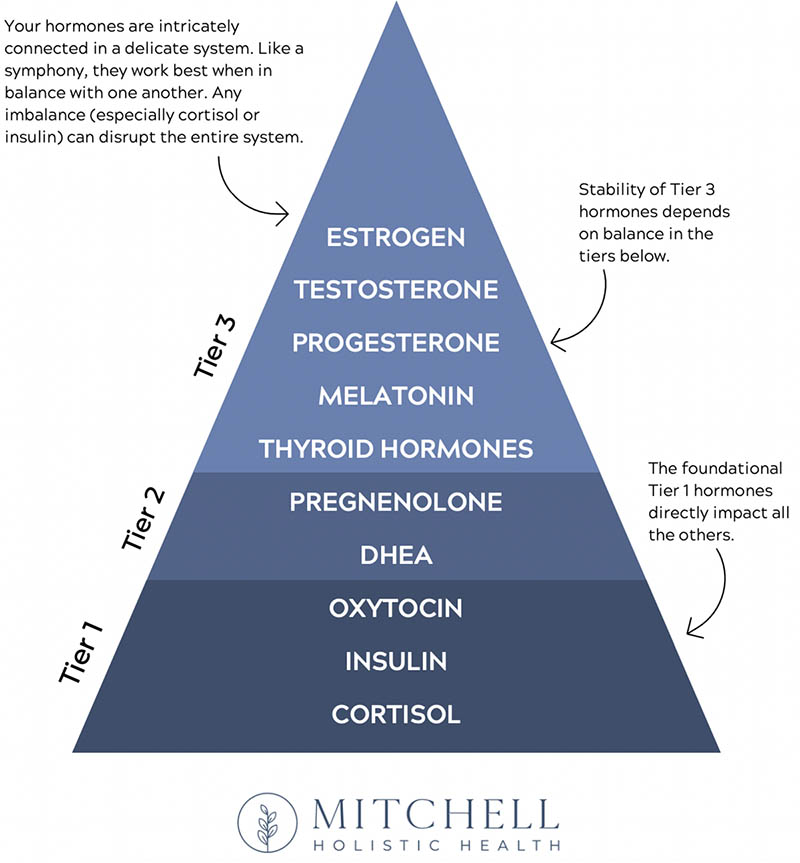Hormones. What a hot topic for lots of women and men alike! Today on our blog, Claire, is going to be talking about the hormone hierarchy and what it means for balancing your hormones.
Hormone Hierarchy
So, let’s get started with the main culprit: cortisol.

Cortisol, a vital hormone produced by the adrenal glands, plays a crucial role in regulating other hormones throughout the body. As part of the stress response system, cortisol influences hormone levels by interacting with the hypothalamus, pituitary gland, and various target tissues. It acts synergistically with adrenal androgens, affecting metabolism, immune responses, and inflammatory reactions. Additionally, cortisol modulates the release of growth hormone, insulin, and thyroid hormones, thereby orchestrating a complex hormonal balance essential for maintaining homeostasis.
On top of cortisol sits insulin, which is vital for regulating blood sugar and weight balance. So, if you struggle with weight loss resistance, there might be something else at play other than not being able to get the scale to budge. Could it be your cortisol? Possibly. But it could also be a lot of other factors in this hormone hierarchy. What I do know, though, is that Tier 1 in this hierarchy has to be regulated and taken care of in order for any of the other tiers to be functioning.
After insulin, we have oxytocin. And what I tell lots of women day in and day out in the clinic is if you want to ever like anyone again, then we need to get this one regulated and under control. 🙂
But like I said earlier, it all comes back to cortisol. If you come into the clinic and tell me your thyroid is offline, I’d say, “Mine was, too!” and then I’d talk to you about how I worked really hard with diet and supplements to heal my gut. And mostly I felt like I did! I stopped having to sprint to the bathroom in public because I was sick to my stomach; I started sleeping better; I started just feeling better overall. But I ignored my stress. And guess what – your adrenals (which remember, produce a lot of cortisol in your body) serve as backup batteries to your thyroid and once they tap out, then guess what… yep, your thyroid goes then, too. That was my particular case. I didn’t take care of my cortisol levels and I ended up right back where I started – back on thyroid medication and trying to fight the daily brain fog and fatigue because what we don’t give enough attention to in society is our cortisol levels. Stress plays as much of a role in your gut health (and hence your overall health) as does what you’re eating.

If you come into the clinic and tell me you think your estrogen is dysregulated, I’m going to say “probably so” and then again, ask you about your cortisol and your stress. What we’ve learned is that yes, hormones may be off, but there’s a reason they are off. I often tell my clients that hormones are like toddlers – they are the first to act out and the last to get back in line. So, we have to give them boundaries and pay attention to the true ‘root cause’ behind why they are acting out. And what we so often see in the clinic as the root cause is two-fold: diet and stress. These two things keep us on the sick hamster wheel. Sadly, though, a lot of people will make the necessary shifts in their diet and see lots of great progress, but to really, truly support healing in the body, we have to address the nervous system and cortisol levels as well.
So, how do we do that? Well, I am glad you asked. 😉
Here are my top 5 tips for regulating your cortisol, which then in turn helps regulate all of the other hormones in your hierarchy:
- Set Boundaries. Not just saying ‘no’ to things, but set boundaries for how you eat, when you eat, how you sleep, when you sleep. Remember how I said that hormones are like toddlers? Toddlers need boundaries, and so do your hormones. Eat 3 meals per day, and keep 2-3 hours in between when you eat.
- Pay Attention to Your Diurnal Clock. Go outside in the morning and get some direct sunlight on your eyeballs (please don’t stare at the sun; that’s not what I’m saying. Just expose your eyes to natural sunlight in the morning). Do the same thing as the sun is going down at night. If you struggle to get up in the morning and wind down at night, this tip is for you so you can reset your diurnal pattern.
- Find a Calming Practice…and do it regularly. Research shows that taking some form of adrenal support and doing a nightly meditation for 10 minutes before bed can help rebalance your nervous system. But the key is consistency. Try this for 2 months and see how your body/mind starts to respond (aka it will stop seeing everything as a trigger and spiking your cortisol).
- Exercise Regularly: Engage in regular physical activity such as aerobic exercise, strength training, or even activities like walking or cycling. Exercise has been shown to reduce cortisol levels and improve overall mood and stress management.
- Maintain a Balanced Diet: Eat a well-balanced diet rich in fruits, vegetables, and protein. Avoid excessive consumption of caffeine and eliminate refined sugars, as these can contribute to spikes in cortisol levels. Additionally, be sure you drink plenty of water throughout the day, as dehydration can also elevate cortisol levels.
Want to learn more about hormone health? Join our VIP list for access to our healthy hormones webinar or give us a call today to book a 1-on-1 appointment with one of our functional medicine practitioners.
**Disclaimer: this is not medical advice. Please consult with your provider before making any changes.

